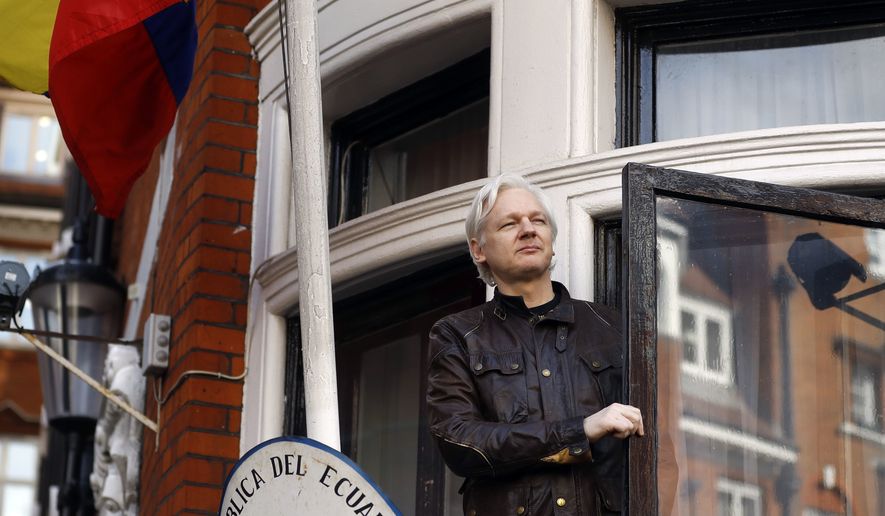WikiLeaks publisher Julian Assange has been granted citizenship by Ecuador amid rekindled efforts to arrange for him to safely exit the nation’s embassy in London.
Ecuador’s foreign minister on Thursday said that authorities agreed to naturalize Mr. Assange, an Australian citizen, as Quito works to resolve the international impasse that made him a residence of its embassy since 2012, The Associated Press reported.
The announcement came after it was reported that the the British government recently rejected a request that would have granted diplomatic status to Mr. Assange and potentially paved the way for him to leave the embassy without risking arrest.
“The government of Ecuador recently requested diplomatic status for Mr. Assange here in the U.K.,” a spokesman for the the U.K. Foreign and Commonwealth Office said Wednesday evening, The Telegraph reported.
“The U.K. did not grant that request, nor are we in talks with Ecuador on this matter. Ecuador knows that the way to resolve this issue is for Julian Assange to leave the embassy to face justice,” the spokesman said.
Mr. Assange, 46, entered the Ecuadorean Embassy in 2012 to avoid answering to Swedish authorities wishing to question him over allegations of sexual assault. He received political asylum that August, and Stockholm prosecutors dropped their investigation in 2017. He still risks arrests if he leaves the embassy, however, because British authorities argue that he broke the law by entering the embassy in violation of previously imposed bail conditions connected to the Swedish probe.
The Trump administration has also expressed an interest in prosecuting the Australian transparency activist in connection with publishing classified documents through his WikiLeaks website, and Mr. Assange said he fears he’ll be arrested by British authorities and sent to the U.S. to face charges if and when he leaves the Ecuadorian Embassy.
Diplomatic status could have potentially provided Mr. Assange with legal immunity and allowed him to exit the embassy and travel to Ecuador without risking arrest.
Ecuadorian media reported earlier Wednesday that an entry for Julian Paul Assange recently appeared in the nation’s civil registry, fueling speculation that he might have received citizenship. A spokesperson for the registry declined to comment on the entry when reached by Reuters.
Ecuador’s foreign ministry, meanwhile, told reporters earlier this week that Quito is seeking a mediator to resolve the impasse as Mr. Assange nears his sixth year in its embassy.
“A person cannot live forever in these conditions, and we are searching in a very respectful way with the United Kingdom … for a solution,” Foreign Minister Maria Fernanda Espinosa said Tuesday.
Mr. Assange did not respond to multiple messages seeking comment.
A United Nations working group previously ruled that Mr. Assange’s living situation amounts to “arbitrary detention” in violation of international norms.
• Andrew Blake can be reached at ablake@washingtontimes.com.




Please read our comment policy before commenting.